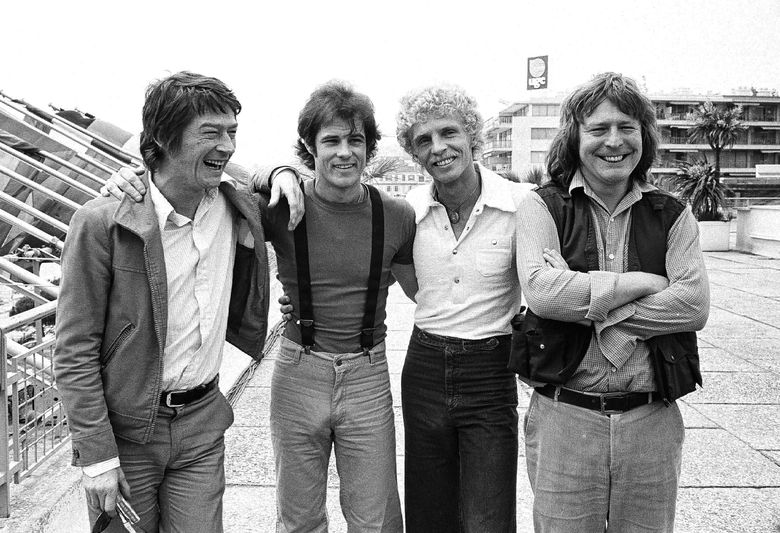Alan Parker was a renowned English film director and producer who made a wide range of critically acclaimed films throughout his career spanning over four decades. Known for his versatility across various genres, Parker directed iconic movies like Midnight Express, Fame, Pink Floyd – The Wall, Mississippi Burning, The Commitments and Evita.
Early Life

Childhood and Formative Years
Alan Parker was born in 1944 in Islington, North London. From a young age, he loved going to the cinema and watched films of all genres. Some of his early influences included films by Alfred Hitchcock, Akira Kurosawa and Stanley Kubrick. As a child, Parker was drawn towards art and photography. He went to art school after finishing secondary education to study graphic design. During this time, his interest in film grew further.
Transition to Film
After working as a copywriter and director of television advertisements for a few years, Alan Parker decided to embark on a career as a filmmaker. His advertising background gave him experience in condensing ideas into short spaces and holding viewer attention with impactful images. Parker brought this visual style and storytelling approach when he began directing films in the mid-1970s.
Directorial Debut and Initial Successes

First Films
Alan Parker’s directorial debut came with the 1976 gangster drama Bugsy Malone, featuring an all-child cast. The unique musical displayed Parker’s flair for novelty and skill with comedic tones. His next film, Midnight Express (1978), saw a major shift into darker subject matter in dramatizing the true story of an American imprisoned in Turkey on drug charges. The film won two Academy Awards. These first works demonstrated Parker’s versatility and avoidance of being pigeonholed to any one style or genre.
Fame and Pink Floyd – The Wall
Parker found further critical success with the musical Fame (1980), looking at students at a New York high school for performing arts. The movie and its pop soundtrack found major commercial success. His next major project saw Parker helm the musical film version of Pink Floyd’s rock opera album The Wall (1982), working closely with the band itself. The surreal film and its examination of isolation and emotional withdrawal became a cult classic.
Hollywood Prominence in the 1980s

Mississippi Burning
In 1988, Parker directed the acclaimed civil rights drama Mississippi Burning, starring Gene Hackman and Willem Dafoe as FBI agents investigating the murders of activists in 1964. Eschewing conventions of the historical drama, Parker focused on a gritty, grounded view of events. The film was nominated for seven Academy Awards. While some criticized its fictionalization of details, Mississippi Burning shone a stark light on racism in the United States and injustice towards Black Americans.
Comedic Departures with Comedy and Satire
Between weightier films, Parker interjected comedic works that contained their own social commentary. Birdy (1984) offered a poignant study of Vietnam War veterans. Come See the Paradise (1990) highlighted America’s mistreatment of Japanese immigrants during World War II. Lighter fare came with The Commitments (1991), a vibrant musical-comedy drama about working-class Dubliners who form an American southern soul band. That film launched many young Irish actors’ careers and became a beloved cultural touchstone in Ireland.
Later Career: Sweeping Historical Dramas
Angela’s Ashes and Life Is Sweet
Later in his career, Parker returned to his Irish roots, directing Angela’s Ashes (1999), a family drama set in Depression-era Ireland based on Frank McCourt’s bestselling memoir. He followed it soon after with The Life of David Gale (2003), an issue-driven drama looking at the moral arguments around capital punishment in Texas. Both demonstrated Parker’s ability to tackle socially relevant themes while crafting emotionally affecting narratives anchored by strong central performances.
Evita
Parker’s cinematic opus came in 1996 with the musical and political epic Evita on the life of Argentinian First Lady Eva Perón. Starring Madonna and Antonio Banderas, the film saw Parker marshaling large-scale dramatics in recreating 1940s Argentina with sweeping sets and crowds of people. The movie captured the operatic quality of Andrew Lloyd Webber’s musical while delving into resonant themes of celebrity, populism, wealth inequality and class divides. Parker received his second Academy Award nomination for Best Director.
Legacy as Director
Over an illustrious career spanning from 1976 to 2003, Alan Parker made films that resonated for their social consciousness, visual craft and flair for the unconventional. He tackled relevant issues while portraying real pathos and humanity. Though working across disparate genres, his movies were linked by their emotional honesty and outsider perspectives on abuse of power. Never afraid of challenging material, Parker created indelible protagonists and made entertainment that captured the cultural zeitgeist while showing marginalized experiences. As a consummate director, he demonstrated vivid visual storytelling and a nuanced exploration of characterization. With his passing in 2020, Alan Parker leaves a towering legacy as one of Britain’s premiere directors of the late 20th century.
Filmography of Alan Parker:
1. Bugsy Malone (1976)
Detailed plot: In a similar setting to the 1920s, young gangster Bugsy Malone falls in love with Blousey Brown and tries to gain control of the drug market in New York.
Hospitality: The film received positive reviews for its originality and the performance of the young actors.
2. Midnight Express (1978)
Type: Drama, thriller
Detailed plot: Based on a true story, it follows Billy Hayes, a young American imprisoned in Turkey for drug trafficking and his attempts to escape.
Hospitality: The film was critically acclaimed for its intensity and received several Oscar nominations.
3. Fame (1980)
Type: Musical, dramatic
Detailed plot: It chronicles the lives of a group of students at the High School of Performing Arts in New York, who face personal and artistic challenges as they try to realize their dreams in the world of entertainment.
Hospitality: The film achieved great commercial success and won two Academy Awards, including Best Original Song.
4. Pink Floyd – The Wall (1982)
Type: Musical, dramatic
Detailed plot: A film inspired by Pink Floyd’s album “The Wall”, which follows the life of a tormented musician, played by Bob Geldof, through fame, isolation and desperation.
Hospitality: The film received mixed reviews but became a cult classic, appreciated especially for its aesthetic and Pink Floyd soundtrack.
5. Birdy (1984)
Type: Dramatic
Detailed plot: The story of two childhood friends returning from the Vietnam War: one physically injured, the other mentally traumatized, who try to find meaning in life.
Hospitality: The film was praised for the performances of the lead actors and Parker’s direction.
6. Angel Heart (1987)
Type: Horror, thriller
Detailed plot: A private investigator is hired to find a missing singer, but soon finds himself embroiled in supernatural events and dark secrets.
Hospitality: The film received positive reviews for its dark atmosphere and Mickey Rourke’s performance.
7. Mississippi Burning (1988)
Type: Drama, thriller
Detailed plot: Based on true events, the film follows two FBI agents who investigate the disappearance of three civil rights activists in 1960s Mississippi.
Hospitality: The film was praised for its powerful historical depiction and received several Oscar nominations.
8. The Commitments (1991)
Type: Musical comedy
Detailed plot: A group of young Irish people form a soul band and seek success in the music business, facing internal and external conflicts along the way.
Hospitality: The film was well received for its soundtrack and the energy of the musical performances.
9. Avoid (1996)
Type: Biographical, musical
Detailed plot: Based on the musical by Andrew Lloyd Webber, it chronicles the life of Eva Perón, from her rise to power until her early death.
Hospitality: The film received mixed reviews, but was praised for Madonna’s performance in the lead role.
10. Angela’s Ashes (1999)
Type: Dramatic
Detailed plot: Based on the novel by Frank McCourt, it follows the life of an Irish family during the poverty of the 1930s and 1940s.
Hospitality: The film received mixed reviews, but was praised for the actors’ performances and faithfulness to the literary source.
11. The Life of David Gale (2003)
Type: Drama, thriller
Detailed plot: An anti-death penalty activist ends up in prison accused of murder and asks a journalist to tell his story before his execution.
Hospitality: The film received mixed reviews, but was appreciated for its controversial theme and the actors’ performances.
12. The Road to Wellville (1994)
Type: Comedy, drama
Detailed plot: Set in the 1920s, it follows people who go to a health facility run by an eccentric doctor, played by Anthony Hopkins.
Hospitality: The film received mixed reviews, with some praising the actors’ dark humor and performances.



